Hiking on nature trails offers a powerful mental health boost by reducing stress, lifting your mood, and improving attention and creativity. Immersing yourself in natural settings lowers cortisol levels, enhances emotional resilience, and clears mental clutter. Regular trail time supports brain health, boosts confidence, and fosters emotional regulation. Plus, accessible trails guarantee everyone can enjoy these benefits. Keep exploring how these outdoor experiences can elevate your overall well-being and mental clarity.
Key Takeaways
- Nature walks reduce stress hormones like cortisol, boosting emotional resilience and mood.
- Exposure to natural scenes enhances attention, creativity, and problem-solving skills.
- Regular hiking improves mental health by decreasing depression and anxiety days.
- Interacting with wildlife and diverse plants stimulates sensory processing and emotional well-being.
- Accessible trails and community engagement ensure inclusive benefits for all mental wellness needs.
The Psychological Power of Natural Environments
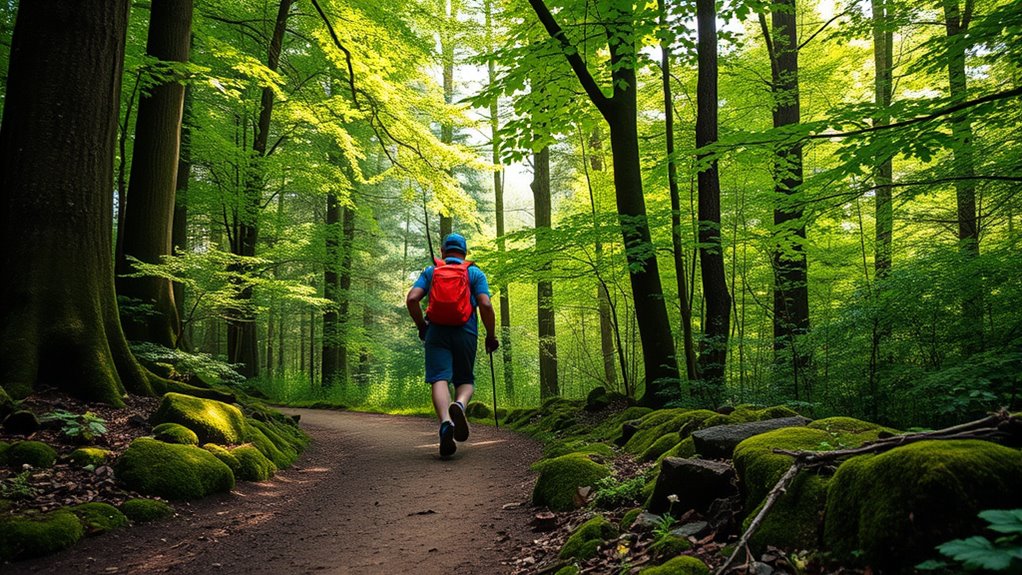
Natural environments have a profound impact on your mental well-being by helping restore your limited-attention resources and boosting cognitive function. When you engage with wildlife interactions, your mind shifts away from stress and rumination, allowing for mental restoration. These settings also hold cultural significance, connecting you to traditions, history, and community values, which deepen your sense of belonging and purpose. Viewing natural scenes enhances attention and executive function, even after short exposures, benefiting children with attention deficits and individuals facing depression. Nature’s ability to improve cognition is supported by simulated and virtual reality experiences, providing accessible ways to gain these benefits. Research indicates that even brief exposure to natural environments can lead to measurable improvements in cognitive performance. Incorporating natural environments into regular routines can serve as a powerful tool for maintaining mental health amidst today’s fast-paced world. Overall, natural environments serve as essential spaces that promote mental clarity, emotional resilience, and a sense of cultural continuity.
How Hiking Reduces Stress and Enhances Mood
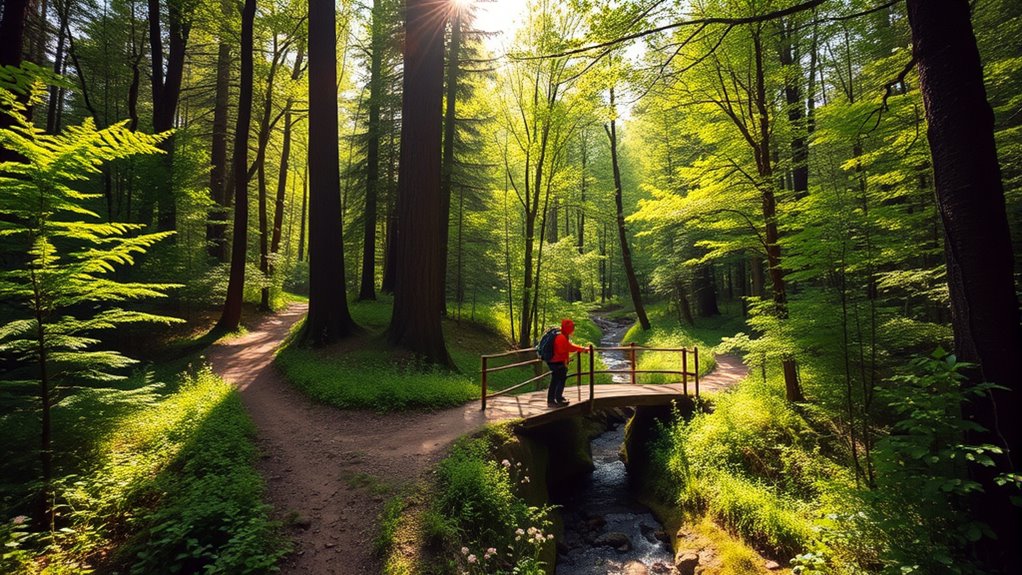
Hiking offers more than just physical exercise; it’s a powerful way to reduce stress and lift your mood. When you immerse yourself in nature, your cortisol levels drop, especially in biodiverse riparian areas. Wildlife encounters and trail mindfulness help interrupt negative thought patterns, decreasing rumination linked to depression. Spending 20 to 30 minutes in nature maximizes cortisol reduction, promoting emotional resilience. The engaging sensory stimuli—seasonal foliage, sounds, and wildlife—boost your mood and sense of achievement. Here’s how hiking benefits you: Research shows that recreational landscape use decisions in natural settings can significantly influence stress levels. Additionally, exposure to natural environments can improve color accuracy in perception, which enhances your overall mental clarity. | Benefit | Mechanism | — | — | | Stress reduction | Cortisol decreases via neural activity in stress-linked brain areas | | Mood enhancement | Nature’s stimuli foster positive emotional states | | Emotional regulation | Trail mindfulness interrupts negative thoughts | | Overall well-being | Wildlife encounters and scenic views promote satisfaction | These effects support better sleep, reduced tension, and improved mental health.
Cognitive Benefits Gained From Trail Time

Spending time on trails can sharpen your attention and improve focus by restoring your brain’s prefrontal cortex, helping you handle multitasking better. It also sparks your creativity and problem-solving skills by engaging your senses and breaking mental routines. As a result, trail time offers a powerful way to boost your cognitive clarity and generate fresh ideas. Furthermore, exposure to natural environments enhances cognitive performance by reducing mental fatigue and clutter. Additionally, engaging with diverse plant designs and natural elements on trails can stimulate sensory processing and emotional well-being.
Enhanced Attention and Focus
Have you ever noticed how a walk through the woods sharpens your focus and clears your mind? This happens because outdoor walking triggers neural activation that supports attention recovery. EEG studies show that nature exposure decreases frontal theta waves linked to rumination, helping you relax and reset. Natural environments boost activity in the prefrontal cortex, which governs executive control, enhancing your ability to concentrate and manage distractions. Walking in nature offers neural benefits beyond exercise alone, differentiating it from urban walks. Relaxation levels during these outings strongly correlate with post-walk cognitive improvements, fostering sustained attention. As a result, your mind becomes more alert and better equipped to handle complex tasks, making trail time a powerful tool for sharpening your focus and restoring mental clarity. Research indicates that natural environments can lead to measurable improvements in neural functions related to attention and cognition.
Boosted Creativity and Problem-Solving
The mental clarity gained from outdoor walks not only sharpens your focus but also considerably enhances your creativity and problem-solving skills. Being immersed in nature, especially amidst flora diversity and wildlife encounters, stimulates brain regions linked to creative thinking. A 25-minute walk in green spaces boosts emotional positivity and provides low-arousal stimuli, fostering cognitive rest. These natural stimuli help reduce cognitive overload, improving your ability to generate solutions. Brain activity during nature walks reveals lower frustration levels and higher meditation states, essential for creative problem-solving. Research indicates that spending four days immersed in nature can enhance problem-solving performance by 50%. Flora diversity and wildlife encounters activate neural pathways tied to creativity. Nature reduces stress hormones, freeing mental resources. Exposure to natural environments also enhances mental flexibility, which is crucial for developing innovative ideas. This process promotes convergent and divergent thinking and restores executive functions for better problem-solving.
Improving Emotional Resilience Through Nature
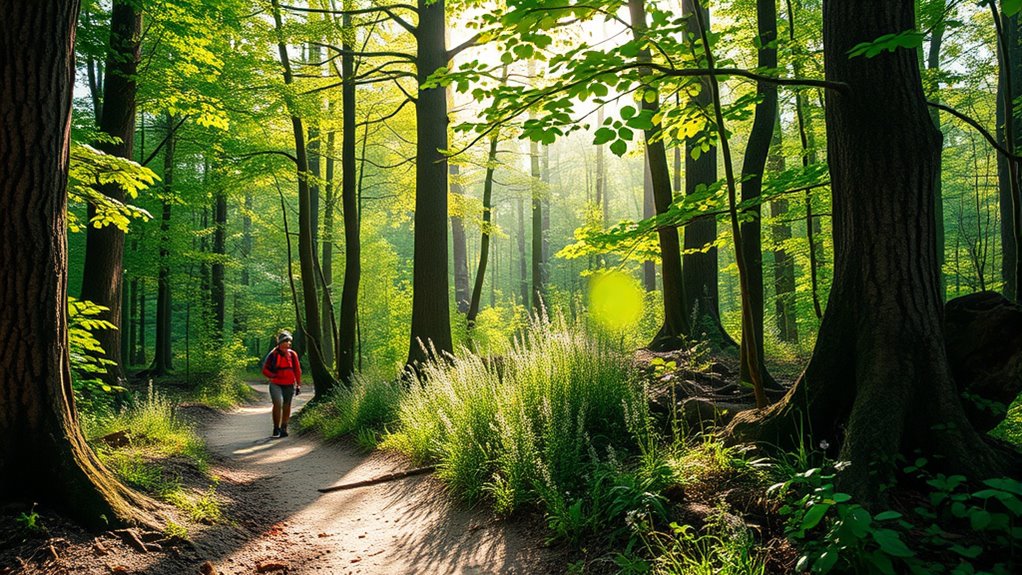
Connecting with nature can substantially boost your emotional resilience, helping you manage stress and bounce back from setbacks more effectively. Nature’s calming effects promote emotional endurance by reducing stress, anxiety, and depression through better emotional regulation. Spending time in high-quality natural environments strengthens your ability to reframe negative thoughts and boosts your sense of vitality, making it easier to cope with challenges. Forest bathing and walks in green spaces trigger faster emotional recovery by lowering physiological stress markers. When you immerse yourself in serene, biodiverse settings, you experience fewer symptoms of anxiety and depression, while positive emotions like calmness and joy flourish. Additionally, utilizing portable camping gear can enhance your outdoor experience, allowing you to maximize the mental health benefits of nature. This connection fosters resilience, enabling you to handle life’s ups and downs with greater emotional stability and strength.
Physical Health and Its Impact on Mental Well-being
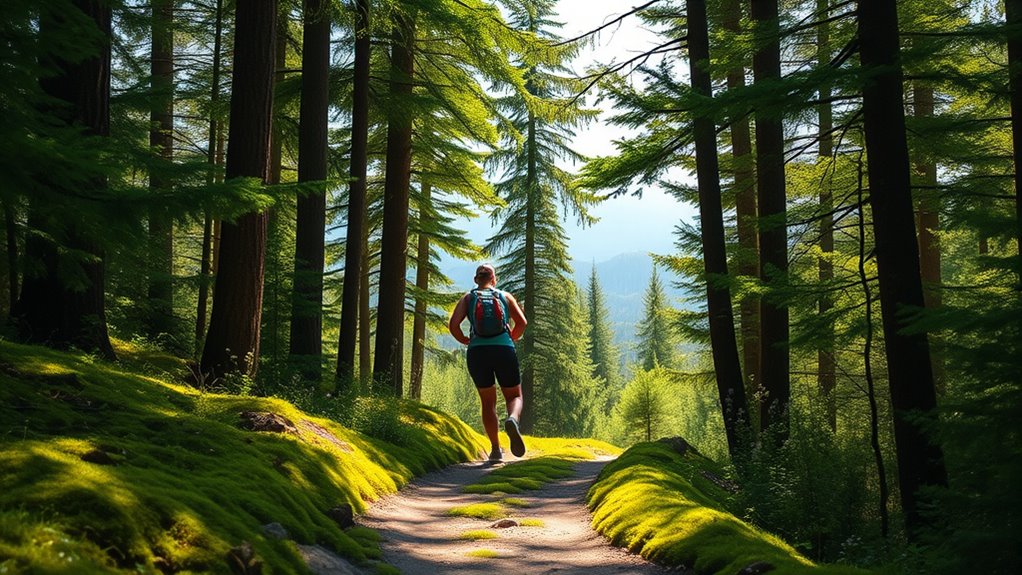
When you stay active regularly, you boost your brain function and improve your mood. Physical health also helps lower stress levels, making it easier to handle daily challenges. As your fitness improves, you build emotional resilience that supports your overall mental well-being. Studies show that engaging in moderate exercise three to five times per week for about 45 minutes each session can significantly reduce poor mental health days, highlighting the importance of consistent activity for mental health benefits. Recognizing the signs of running dry, such as fatigue or emotional exhaustion, is crucial for maintaining mental wellness and preventing burnout.
Exercise Boosts Brain Function
Engaging in regular aerobic exercise can substantially enhance your brain’s structure and function. It promotes neuroplasticity enhancement and brain structure growth, leading to sharper cognitive abilities. As you exercise, your brain produces signaling molecules like BDNF, supporting neuron growth and connectivity. This results in benefits such as:
- Enlarged hippocampus, boosting memory and learning
- Increased gray matter volume, improving neuronal health
- Enhanced white matter integrity, speeding neural communication
- Better cognitive control, attention, and processing speed
- Preservation of cognitive function with aging
These structural changes translate into improved cognitive performance across all age groups. Consistent aerobic activity not only sharpens your thinking but also builds brain resilience, helping to guard against age-related decline and neurological disorders.
Physical Health Reduces Stress
Have you ever noticed how a brisk walk or workout can make you feel calmer afterward? That’s because physical health plays a key role in stress coping. Regular physical activity, like hiking, can lower perceived stress by up to 50%, and expending more than 3.0 kcal/kg/day considerably reduces stress risks. Staying physically fit helps buffer against stress-induced mood declines, maintaining emotional resilience even during tough times. Exercise also improves mental health indicators, leading to fewer days of depression and anxiety. When you stay active, you’re better equipped to handle stress, as physical fitness supports your body’s ability to respond calmly to challenges. Airless paint sprayers are an example of tools that require proper maintenance to ensure optimal performance during projects. So, the next time you hit the trail, remember—your physical health is a powerful tool for reducing stress and boosting mental well-being.
Fitness Enhances Emotional Resilience
Fitness plays a crucial role in strengthening your emotional resilience, helping you cope better with stress and life’s challenges. When you improve muscular fitness, you boost your confidence and self-efficacy, making emotional setbacks easier to handle. Stronger muscles aren’t just physical; they support mental toughness too.
You’ll notice that:
- Muscular fitness correlates with greater stress resilience.
- Self-efficacy mediates the link between fitness and emotional strength.
- Regular exercise enhances your ability to manage negative emotions.
- Feeling fit boosts your confidence to face challenges.
- Physical activity promotes neurobiological and psychosocial well-being.
- Incorporating mind-body approaches like somatic therapy can further enhance emotional resilience and facilitate holistic healing.
Making Nature Trails Accessible for Communities
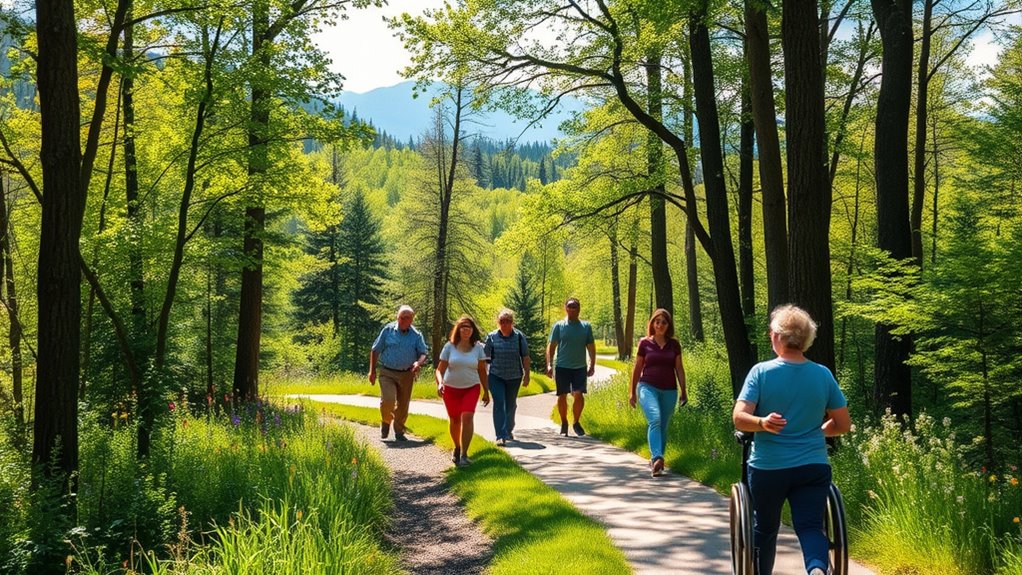
How can communities guarantee that their nature trails are accessible to everyone? It starts with diligent trail maintenance, ensuring surfaces are smooth and stable, slopes are gentle, and pathways are wide enough for wheelchairs and mobility aids. Regular inspections prevent muddy or rough terrain from blocking access. Community outreach is essential—engaging marginalized groups and people with disabilities to gather feedback helps identify barriers and improve trail design. Signage should include clear information on trail difficulty, elevation, and surface type, with accessible features like tactile guides and Braille. Adding benches, accessible restrooms, and parking near trailheads enhances usability. Collaborating with local organizations and policy-makers ensures funding and standards are met, creating inclusive spaces where everyone can enjoy the mental and physical benefits of nature. Additionally, understanding market research strategies can help communities better tailor their efforts to meet diverse needs and preferences.
Frequently Asked Questions
How Much Time in Nature Is Needed for Mental Health Benefits?
You only need about 10 to 20 minutes in nature to see mental health benefits like reduced stress and improved mood. Incorporate nature meditation or explore trail diversity to maximize these effects. Regularly spending at least two hours weekly, whether in one or multiple outings, can boost your overall well-being. Even brief, frequent visits help manage anxiety, depression, and enhance emotional regulation, making nature an accessible, powerful tool for mental health.
Are Certain Types of Trails Better for Psychological Well-Being?
You might find it no coincidence that certain trails boost your mood more than others. Trails with diverse scenery and moderate difficulty challenge you just enough for a sense of accomplishment, while lush, natural settings reduce stress better than urban paths. These types of trails encourage deeper engagement and mental restoration, helping you reconnect with yourself and nature. So, choosing the right trail scenery and difficulty can truly enhance your psychological well-being.
Can Hiking Help Manage Specific Mental Health Conditions Like Anxiety?
You might wonder if hiking can help manage anxiety. The answer is yes—hiking reduces anxiety symptoms through physical activity and exposure to nature. Incorporate mindfulness practices during your hike to deepen relaxation, and consider social hiking to boost mood and provide support. Regular outdoor walks, especially those lasting around 120 minutes weekly, can improve stress regulation and help manage anxiety effectively.
What Are the Long-Term Mental Health Benefits of Regular Trail Walking?
Imagine you start walking trails regularly; over time, you’ll notice improved mood and resilience. Long-term, nature connection fosters stress reduction, helping you manage daily pressures more effectively. Consistent trail walking enhances emotional well-being, sharpens focus, and boosts problem-solving skills. These ongoing benefits build a mental foundation that supports your overall health, making you more resilient against mental health challenges and nurturing a lasting sense of calm and balance.
How Can Urban Areas Better Integrate Nature Trails for Mental Wellness?
You can better integrate urban green spaces by designing trail accessibility into city planning. Focus on connecting residential areas with green corridors, ensuring equitable access for all residents. Incorporate diverse vegetation and quiet routes that promote mental wellness, and prioritize underserved neighborhoods. Collaborate with community groups and health professionals to create inclusive, scenic trails that encourage regular use, helping urban residents enjoy the mental health benefits of nature close to home.
Conclusion
Just like the ancient explorers who found clarity and renewal in uncharted lands, you too can access mental clarity on nature’s trails. As you breathe in the fresh air and step into the wilderness, you tap into a timeless source of peace and resilience. Embrace these journeys, and let the serenity of the natural world be your guiding light, transforming stress into strength and mind into a sanctuary. Your path to wellness awaits beyond the horizon.









